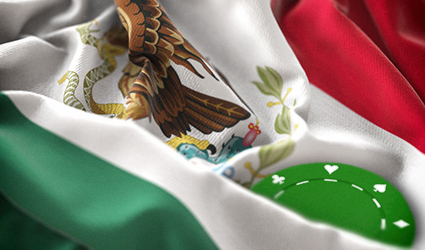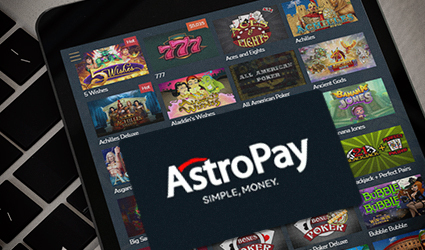Online casinos accepting players from Mexico
 Online gambling in Mexico operates under a permit-holder model. Only land-based SEGOB permit holders can legally extend to online; no new permits are being issued, so most brands enter via partnerships or sublicences with existing permit holders. This is not a “virtually unregulated” market - the framework is federal (SEGOB), anchored in the 1947 law and 2004 regulations, with online treated as an extension of a land-based permit.
Online gambling in Mexico operates under a permit-holder model. Only land-based SEGOB permit holders can legally extend to online; no new permits are being issued, so most brands enter via partnerships or sublicences with existing permit holders. This is not a “virtually unregulated” market - the framework is federal (SEGOB), anchored in the 1947 law and 2004 regulations, with online treated as an extension of a land-based permit.
Players do have a wide choice: the landscape is dominated by a few large brands (notably Caliente, BetMexico, bet365, Codere, Playdoit), alongside additional locally authorised sites and some dot-coms still visible to users. Stake has secured a local licence but told NEXT it has no immediate plans to go live.
Sports betting makes up about 60% of all Mexican online gambling with traditional games like blackjack, lottery, poker, and slots accounting for the balance. Online gambling wagers are thought to be about four times as much as land-based betting but experts disagree on a precise number. In 2005 the government officially brought bookmaking into the regulated sphere: industry projections indicate online GGR ~US$3.2bn vs retail ~US$2.75bn, meaning online is set to overtake retail for the first time.
Best Online Casinos for Mexicans
Legal and Tax Matters
Mexico’s gambling framework is federal, with oversight by the Secretariat of the Interior (SEGOB). The industry still operates under the 1947 Federal Gaming and Raffles Law and its 2004 regulations, which allow land-based permit holders to extend their activities online. There are currently no new permits being issued, meaning that any operator entering the market must do so through a partnership or sublicence with an existing permit holder.
Although the legal structure is dated, it remains the foundation of the market. The last major wave of licence issuance occurred in the mid-2000s, when the Interior Ministry granted hundreds of permits. Since then, the government has effectively maintained a moratorium on new licences, and the policy continues under President Claudia Sheinbaum, who took office in 2024.
Efforts to modernize the legal framework are ongoing. SEGOB launched formal consultations in 2024–2025 with industry associations such as AIEJA and APJSAC to draft a new Gaming and Lotteries Law. This bill, expected to reach Congress in 2026, aims to replace the outdated 1947 statute and introduce consistent national standards for online licensing, taxation, and player protection. Until that happens, Mexico’s system will continue to rely on permit-based extensions and fragmented state-level tax rules.
Tax structure: operators are subject to a 30% corporate income tax and a 30% IEPS (Special Tax on Production and Services) on gross gaming revenue, applied to both online and land-based operations. Around 1–2% of profits are also payable to SEGOB as a licensing fee, while state and municipal governments can levy additional 6–10% local consumption taxes and 4–6% taxes on player winnings. Operators may deduct up to 20% of IEPS when local taxes have been paid.
In September 2025, Finance Minister Édgar Amador proposed increasing the IEPS rate from 30% to 50% of GGR as part of the 2026 Economic Package. The plan remains under discussion and has not yet been enacted, but if approved it would substantially raise the tax burden for both online and retail operators.
Enforcement against unlicensed or offshore sites is still inconsistent, though discussions between SEGOB and Mexico’s cyber police are underway to improve coordination. Until a comprehensive reform is implemented, this uneven oversight allows offshore and grey-market operators to continue serving local players with little interruption.
Timeline of Important Legal Milestones
 1935 – Most gambling banned by presidential decree
1935 – Most gambling banned by presidential decree- 1947 – Federal Gaming and Raffles Law prohibits casino and gaming nationwide
- 2004 – Implementing regulations reintroduce legal gambling; online offered as an extension of land-based permits
- 2005 – Hundreds of licences granted by the Interior Ministry
- 2010 – Class III slot machines authorised
- 2015 – Ladbrokes partners with Cirsa for online sportsbook and casino
- 2018 – TV Azteca granted 25-year licence for land-based and online operations
- 2019 – bet365 enters Mexico via partnership with TV Azteca
- 2020 – 16% VAT on offshore operators introduced (still without enforcement mechanism)
- 2022 – La Lotería Nacional de México created through merger of national lottery bodies
- 2024–2025 – SEGOB consults with industry on draft Gaming and Lotteries Law
- 2025 – Government proposes IEPS tax increase from 30% → 50% of GGR
- 2026 (expected) – Draft law to be submitted to Congress
With no full federal reform yet in place, individual states still exercise partial authority to tax or restrict casinos and may interpret their powers differently. Industry associations continue to advocate for uniform licensing, taxation, and consumer protection, but until a comprehensive federal law is passed, the sector remains fragmented and dependent on the discretion of SEGOB.
Trusted casinos
One way to find a casino you can trust is to check into how the local licensing jurisdiction handles complaints and talk to other players around you. Sometimes a player's best bet is to not play at state-sanctioned properties for any number of reasons. While Codere or Caliente may seem perfectly fine places to play - and while you must take complaints at some consumer review sites with a grain of salt, we have rarely seen such bad approval numbers (80%). It should be noted that sportsbooks and hybrid sports/casinos often have poorer reputations than casino-only sites for various reasons.
Other factors to consider may be game odds and incentives. Licensed operators in Mexico pay a 30% tax on revenues at the federal level. While offshore operators are presumably supposed to pay a VAT for services of 16%, it’s highly unlikely any do unless they are working in cooperation with a locally licensed operator.
It’s possible that offshore operators have a more business-friendly operational structure with no need to feed real-time coin-in and coin-out data to regulators, lower overhead through paying no tax or a lower tax, and no need to supplement a land-based operation. This would presumably create more profit potential for the operator who could then increase the odds for players by raising RTP (theoretical return to player percentages) and offering more lucrative bonuses that allow players to win more and win more often. While that’s hypothetical it just makes sense.
One way to save time in finding a trusted casino is to rely on non-biased and critical reviews of online gaming sites, but the final decision is always up to the player.
Looking at the casinos listed on this page you might notice that they are ranked by the rating players at multiple sites have given them. While we haven’t reviewed every site that accepts players on these pages, the rating system is also fed by players at review sites and forums that have reviewed them. Regardless, if you stick close to the top of the list when choosing a casino you stand every chance of having a very enjoyable experience.
That is not to say that a site with a 3.0 rating might not be the perfect site for you. Player ratings are very subjective. A lower rating might simply mean that a large number of players visited for a free chip, perhaps didn’t win, and possibly thought the wagering requirements were too high. So if you see an offer you like, but the site isn’t ranked extremely high, you might want to read the review to find out more about the site. We’ve done the hard work for you and thousands of other players have weighed in. We hope you find the effort valuable.
Making it a little more complicated for the player who wants to do all of their own research is the fact that there are several gambling sites that have been in operation for a very long time but may not be run by the most savory characters. In a nutshell, there are clip joints and brigands out there, just as there are in any other type of business.
The actual age of an online operation is not a very important consideration except for the fact that an older site will have a reputation with much more depth than less seasoned operations. In some instances, it’s more important to know about the operator than it is to have a lengthy history of customer satisfaction or complaints. Reviews at trusted sites will usually focus on the operator as much as the site itself when it is an extremely good potential choice or a site to avoid.
And then, of the more than 10,000 online casinos, there are quite a few in the middle of the spectrum. These sites might be great for one customer and simply not offer what another player wants. Some will have very liberal rules and others will have tough rules but might offer something else to balance the equation such as instant payouts or lucrative bonuses. If a review site focuses on the good, the bad, and the particulars, there’s a good chance it can be trusted.
In addition to World Casino Directory reviews, we’ve found a few other portals to be excellent sources of information when choosing a casino to play at. We’ll link to them below.
In addition to reading trusted reviews, it’s always important to read and understand the terms and conditions yourself. A good review can save valuable time by pointing out things to look for.
Other valuable tools that Mexican players have at their disposal are industry Blacklists, watch lists, and casino warnings. While good casinos can go bad and bad casinos can turn a corner or turn over a new leaf if a site is currently on one or more blacklists it’s a very good idea to steer clear and choose one that is more highly rated.
We have found the following information and review sites to be trusted to deliver unbiased transparent accurate and timely information.
Trusted Portals
Getting paid
We’ll combine document verification and banking methods here because one is no good without the other when trying to cash out your winnings. We’ll also throw in a bit of bonus caution because breaking the terms of a bonus offer is still one of the most common ways of turning the excitement of a nice win into disappointment and nobody wants that.
When you register your account or join the casino (same thing), make sure to use accurate personal information that matches your official identification documents. If your phone number or address changes, update it before playing again. This remains the core element of getting paid.
Mexican-licensed operators are required to verify identity through the national CURP (Unique Population Registry Code) and RFC (tax ID) numbers. You’ll need to provide a government-issued ID or passport, and in most cases, a recent proof of address such as a utility bill. These checks are part of the KYC (Know Your Customer) process - online casinos are not allowed to pay winnings unless they have verified your identity. Once cumulative deposits exceed roughly MXN 36,770 (updated annually), enhanced due diligence is triggered, which may require additional documentation.
When you head to the cashier section, double-check that the deposit method you choose also works for withdrawals. In Mexico, the most common options are SPEI bank transfers and credit/debit cards, which together handle around 60–70% of all transactions. SPEI transfers are valued for their speed, security, and lack of chargebacks. Cash voucher services like OXXO are widely accepted for deposits but don’t support withdrawals, so you’ll need an alternate method such as a bank transfer for payouts.
If you have trouble lining up compatible deposit and withdrawal options, review the casino’s banking terms or contact customer service before depositing. That simple step can save you time later.
Lastly, you aren’t required to take a bonus to play. A straight deposit, a bit of luck, and a timely withdrawal are the very essence of gambling. A bet laid is a bet paid. But if you decide to accept a bonus for extra playtime or jackpot chances, always read the terms and conditions carefully. Check which games qualify, the maximum bet per spin or hand, rollover requirements, and payout limits attached to bonus winnings.
Slots
Roulette
Blackjack
Video Poker
Online Casino Banking in Mexico
 The most widely used payment methods at Mexican online casinos today are SPEI bank transfers and credit or debit cards such as Visa, Mastercard, and Maestro. Together, they handle about 60–70% of all deposits and withdrawals. SPEI transfers are especially popular because they process instantly, are secure, and don’t carry chargeback risk for operators or players.
The most widely used payment methods at Mexican online casinos today are SPEI bank transfers and credit or debit cards such as Visa, Mastercard, and Maestro. Together, they handle about 60–70% of all deposits and withdrawals. SPEI transfers are especially popular because they process instantly, are secure, and don’t carry chargeback risk for operators or players.
OXXO remains a common deposit option for players who prefer cash payments, though it’s available only for deposits and not withdrawals. AstroPay, Todito Cash, and regional eWallets are still accepted at many sites targeting the Mexican market, but their availability varies by operator.
International eWallets like Skrill and Neteller continue to support transactions, though they’re less widely used than in previous years. Many local players now favour direct bank methods because most Mexican banks are fully integrated into the SPEI network, which allows faster payouts and minimal fees.
SafetyPay continues to function as an alternative online banking solution across Latin America, offering quick and secure deposits via connected banks and cash collection points, though it’s less visible than SPEI for Mexican users.
Bitcoin and Other Cryptocurrencies
Cryptocurrency use in the regulated sector has become limited. While crypto-friendly platforms still exist offshore, licensed Mexican operators are not permitted to process crypto transactions directly, as SEGOB continues to treat them as outside the approved payment framework. Players who prefer crypto often convert through external exchanges before depositing via traditional methods.
Bitso remains Mexico’s leading exchange, with more than five million users, and is used primarily for buying, selling, or transferring crypto assets rather than for direct casino payments. The company’s partnership with Mastercard, announced in 2022, now supports limited card-based transactions but is not connected to regulated gambling payments.
Players who use services such as eToro or CEX.io can still trade or hold digital coins, but casinos licensed under Mexican law won’t process deposits or withdrawals in cryptocurrency. For this reason, crypto bonuses are uncommon in the regulated market, and players should treat any “crypto casino” accessible from Mexico as part of the offshore segment rather than the licensed domestic one.
How to Play at Online Casino in Mexico
Almost every online operator today delivers a casino lobby directly in your secure web browser through HTML5 technology. This means it no longer matters which operating system you use — whether it’s Windows, macOS, or Android — as long as you have an internet connection. Players can enjoy games on PCs, laptops, tablets, smart TVs, or any mobile device with a browser.
Mobile gaming continues to expand rapidly across Mexico. According to the 2025 Digital Mexico Report, there are now 110 million internet users, representing 83.3% penetration, and over 127 million active mobile connections — that’s 96.5% of the population. With such high connectivity, online casino games are perfectly optimized for mobile play, ensuring smooth experiences on virtually every modern smartphone.
Connectivity is strongest in major cities like Mexico City, Monterrey, and Guadalajara, where 4G LTE covers more than 90% of the population. 5G networks are beginning to roll out, offering faster and more stable performance for players in urban centers. In rural and semi-urban regions, 3G networks still provide access, though at lower speeds — yet even these are fast enough to handle lightweight casino games that run primarily on server-side processing.
Most users in metropolitan areas enjoy high-speed connections capable of supporting not only slot and table games but also live dealer and game-show-style titles in real time. With mobile-first design now standard among operators, playing casino games in Mexico has never been more accessible — whether at home, on the move, or anywhere with a stable signal.
Real Money Games for Players in Mexico
Slots remain one of the most popular online games in Mexico, and most casino sites offer more slot titles than any other category. Only a few live-dealer-only websites deviate from that rule.
On our review pages, the sidebar menu still lists every game supplier, the number of titles available, and other detailed information in a clear, analytical format. Our reviews continue to cover every essential detail for readers who want to compare operators and platforms.
Casino lobbies vary in size depending on the platform — some, like those running on RTG, may offer under 300 games, while others boast thousands. Regardless of volume, players can expect a full range of entertainment, including blackjack, poker, roulette, craps, and baccarat, along with a huge choice of video slots, jackpot progressives, bonus buy titles, skill-based games, and video bingo at locally focused sites.
According to the latest market data, sports betting accounts for about 60% of online gambling activity in Mexico, followed by live casino games (50%) and lottery (40%). Slots and poker also show strong engagement, while bingo, although slightly declining, still outperforms many other verticals compared to international markets. Mexican players are increasingly multi-vertical, often moving between sportsbook and casino products within the same session.
Women now represent roughly 40% of online casino players, up significantly from a few years ago when the share was closer to 20–30%. Table games, such as blackjack and poker, are especially popular among higher-income players, while slots continue to attract the broadest audience overall.
If a casino site doesn’t include a sportsbook, players can still enjoy virtual sports, which simulate betting on events like tennis, football, horse racing, motor sports, darts, or cycling, complete with realistic 3D graphics and familiar bet slip formats.
Finally, live dealer games are now a staple at most Mexican online casinos. Depending on the provider, you’ll find popular titles like Caribbean Stud Poker, Casino Hold’em, Crazy Time, Lightning Roulette, Mega Ball, Dream Catcher, Deal or No Deal Live, Super Sic Bo, Ultimate Texas Hold’em, Infinite Blackjack, and Monopoly Big Baller, among many others. These interactive studios bring real-time play to players nationwide, supported by Mexico’s increasingly stable high-speed mobile networks.
The Best Live Casinos in
Licensed Offshore Casinos
Nearly all of the casinos you find on our pages are licensed in their respective jurisdictions. Whenever we review a site that does not display a license we’ll make that fact abundantly clear and we’ll let you know what we know about the operator. Due to gambling laws in the US, Australia, and some other regions, not all operators want to be identified but we can almost always tell you whether they can be trusted or not.
For example, I’ve been playing at a site that is “licensed” in Costa Rica for over 20 years. The fact of the matter is that there are no casino licenses issued by the Costa Rican government, only business licenses to run servers for international trade. I’ve never had a single problem with them paying me on time or honoring a bonus they have offered.
On the other end of the spectrum, operators licensed in some of the most stringent regulatory regimes in the world can end up drawing a lot of consumer complaints, face heavy fines, or even lose their credentials so ultimately the location or visibility of a license is not always important.
That said, many of the sites you will visit from Mexico will be licensed in the Caribbean, and most of those will have a Curacao license. These operators are required, at a minimum, to be well funded, have no criminals in their organizations, maintain anti-money laundering, age verification, and identity policies, and provide at least self-exclusion as a responsible gambling policy.
Customer advocacy is not currently part of the remit, so you will need to do your own due diligence like reading trusted reviews, checking the terms and conditions, and checking industry blacklists once in a while.
For the last decade and a half, online gambling at offshore sites in Mexico has been perfectly legal for residents. While we don’t expect that to change any time soon, it could if the federal government can exert enough power of regional interests to reign everyone into a single tax scheme and then a regulatory framework. We’ve seen that happen in as little as a year or two in some places when the desire for tax revenues hand in hand with a perceived need for consumer protections outweighs and overwhelms interests who prefer to operate in the shadows.
For a timely analysis of all legal aspects of gambling in Mexico please see Thompson Reuters Practical Law - Gambling in Mexico
To keep abreast of breaking news on gambling legislation and other developments please see World Casino News Mexico.
Author: Lars Jones


